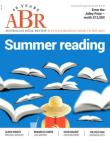AustLit
 7003017629158529804.jpg
7003017629158529804.jpg
Image courtesy of publisher's website.
Alternative title:
ABR
Issue Details:
First known date:
2018...
no.
398
January–February
2018
of
Australian Book Review
est. 1961
Australian Book Review
The material on this page is available to AustLit subscribers. If you are a subscriber or are from a subscribing organisation, please log in to gain full access. To explore options for subscribing to this unique teaching, research, and publishing resource for Australian culture and storytelling, please contact us or find out more.


